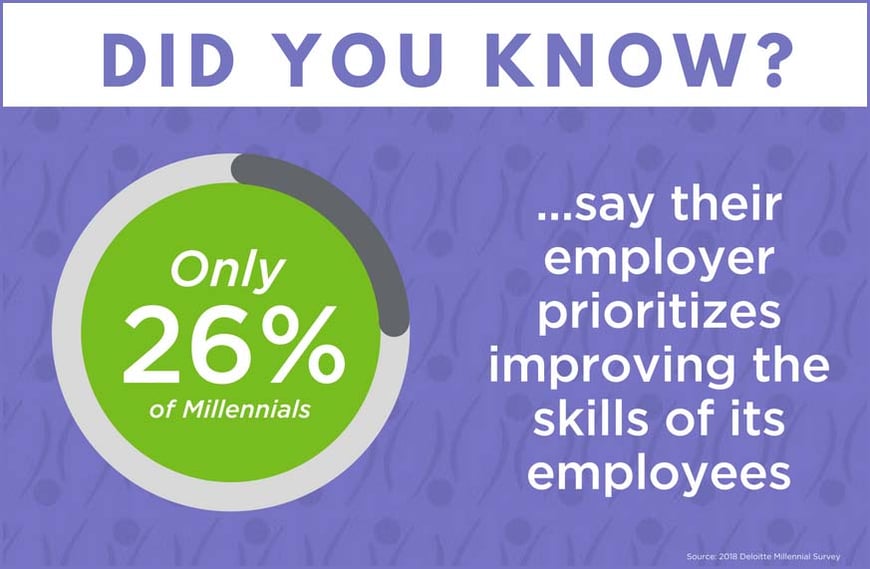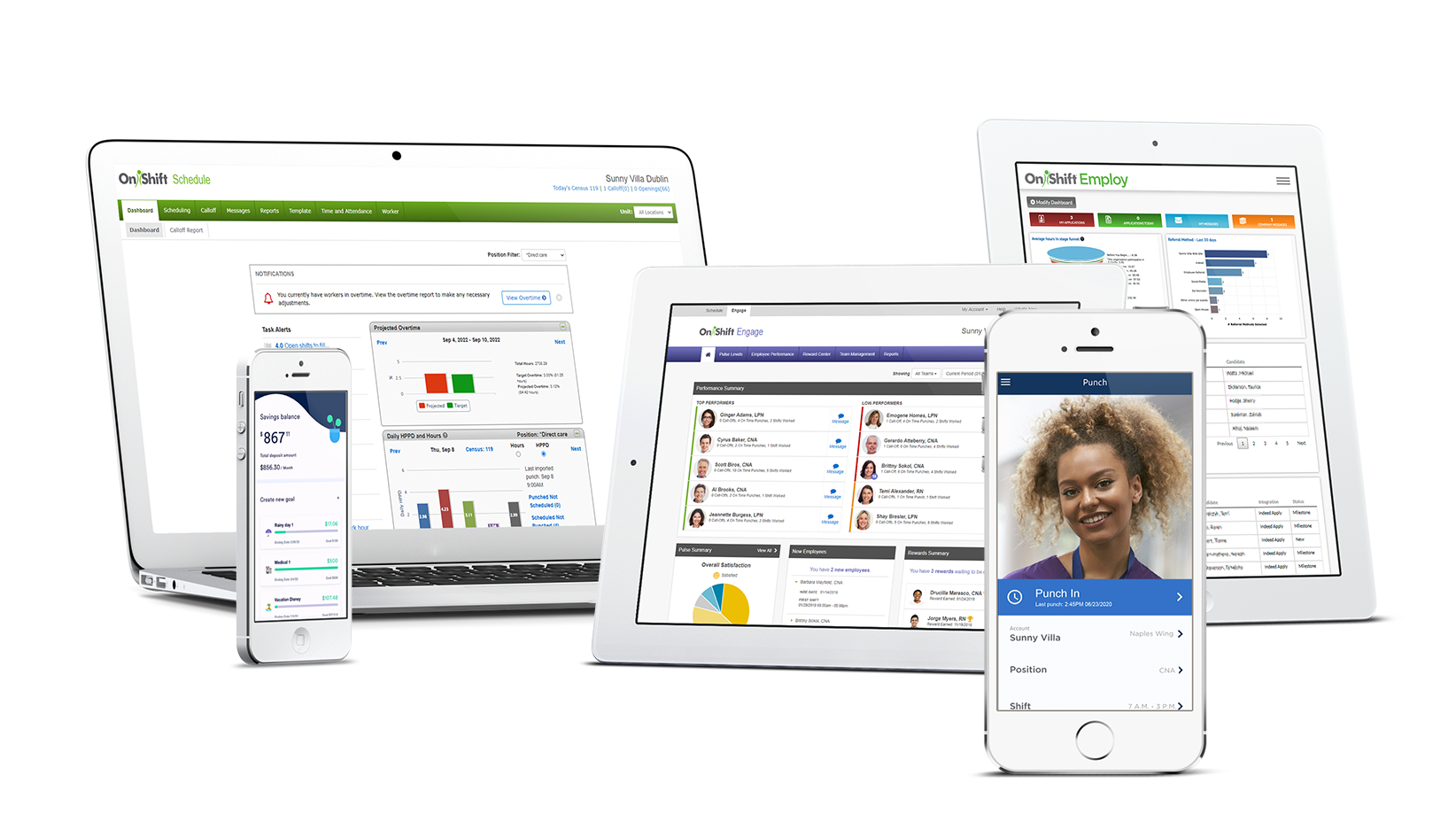August 2, 2018 | Mike Pumphrey
August 2, 2018 | Mike Pumphrey
 Only 26% of the younger workforce feels that employers are helping them develop the skills they will need most in today’s evolving job market, a skills gap that is making them anxious about their work prospects.
Only 26% of the younger workforce feels that employers are helping them develop the skills they will need most in today’s evolving job market, a skills gap that is making them anxious about their work prospects.
Add to that the fact that approximately 65% of caregivers are “always looking for a better job,” and it’s clear that companies need to help caregivers, especially younger ones, improve their critical skill development.
While all workers need to build hard skills pertinent to a given job, the skills caregivers are looking to develop are soft skills, most notably:
Here are four tips on how companies can help caregivers improve their skill development and succeed in their roles.
1. Set Clear Expectations
Respondents to the Deloitte survey referenced above expressed a lack of confidence in their ability to succeed in “Industry 4.0,” the new job landscape formed by, among other elements, artificial intelligence, the Internet of Things and data analytics. They also expressed concern that employers are falling short in helping them develop the soft skills they need to excel.
In addition, they also want to see employers and business leaders be proactive about affecting positive change in the world. This aligns perfectly to the calling and mission of caregivers and the senior care industry.
There’s workforce technology on the market today that allows providers to track performance metrics like punching in and out on time and not calling off for several shifts in a row. In fact, OnShift’s employee engagement software uses a point system to help providers reward good behavior and milestones for increased staff satisfaction and stellar performance.
It’s the employers who set clear expectations to caregivers about how their performance will be measured and how they will succeed in the mission-driven senior care field that will have an advantage with these workers.
2. Put The Right Mentors & Managers In Place
“Though technology is increasingly augmenting work today, respondents are looking for guidance that’s far broader than how to use that technology,” the Deloitte survey authors write. This is especially true for caregivers, as they face many unique, interpersonal challenges. Caregiving is both a science and an art. For those new to the profession, having the right mentors to offer guidance can ease the burden caregivers feel by providing the additional support needed to excel.
Millennial and Gen Z engagement expert Ashira Prossack offers these tips to employers: “Teach (young workers) so that they can use the skills they’re learning to solve another problem in the future. Balance out the times you help with times where you let them work through a problem on their own with minimal guidance. Support them by helping them develop critical thinking and problem-solving skills.”
Managers are also critical to employee success – and the ones that aren’t fit to inspire and lead can have a detrimental effect. Administrators, executive directors, department leaders and supervisors set the pulse for the community and their teams.
According to OnShift EVP, Peter Corless:, “Managers are everything. It starts at the top and trickles down. It permeates everything, from who you put into leadership positions to decisions you make about the allocation of resources.”
3. Deliver & Collect Frequent Feedback
Working as a caregiver is a 24-hour job. There are constant emotional and physical challenges; one where workers must adapt on the fly and think on their feet. Organizations can help caregivers succeed in this fast-paced, ever-changing environment by delivering frequent feedback.
“Both manager and Millennial new hires will benefit if feedback is given in the moment and in small doses, when the stakes are mostly low, but the learning opportunity is large,” says John Rossheim at hiring website Monster.com
Shelly Szarek-Skodny, CEO of Century Oak Care adds: “Whether through webinars or offsite training, it’s very important to have structure in ongoing learning. People need to count on a constant information flow and investment in their education and your ability to sit and meet with them."
Additionally, providers can improve the workplace by regularly measuring staff satisfaction and collecting feedback from them. We’ve worked with several providers who have made substantial process improvements that stem from employee ideas.
4. Make Analysis A Requirement
To help workers build critical thinking, confidence and creativity, there might be no better technique than creating opportunities for analysis.
“Nothing develops critical skills like digging into data, sorting through it to find trends, and boiling down observations into simple recommendations (yes, even written on one page),” Scott Mautz, author of “Find the Fire: Ignite Your Inspiration and Make Work Exciting Again“ writes for Inc.com. “Analysis isn't just for analysts — every employee should get practice.”
However, analysis does not just have to be about data. Ask caregivers to analyze their actions and think critically about why they had success in a particular resident interaction, or why they failed. Pushing caregivers to analyze their own work might give them everything they want and need.
Sources:
2018 Deloitte Millennial Survey Millennials disappointed in business, unprepared for Industry 4.0, 2018
Predictive Analytics Reduce Staff Turnover, 2018
6 Ways To Help Millennials Excel At Work, Ashira Prossack, 2018
How to Help Millennials Fill the Soft Skills Gap,John Rossheim
A New Deloitte Study of 10,455 Millennials Shows They Need Help Improving These 4 Skills, Scott Mautz
Subscribe to the OnShift Blog
Recent Posts
Categories
About Mike Pumphrey
Mike Pumphrey is Vice President of Product Marketing at OnShift. His expertise in staffing and labor management strategies in long-term care and senior living is foundational to his role leading OnShift’s Product Marketing team. Mike works hand-in-hand with state and national associations, senior care providers, and with OnShift’s Customer Success and Product teams to create impactful best practices aimed to help solve the daily workforce challenges in senior care. Mike shares insights, research and recommendations to improve clinical, operational, and financial outcomes through regular blog posts and conference speaking engagements.
See for yourself why thousands of providers rely on OnShift’s innovative software for recruitment, hiring, workforce management, pay and engagement. Request your personalized demo today.
